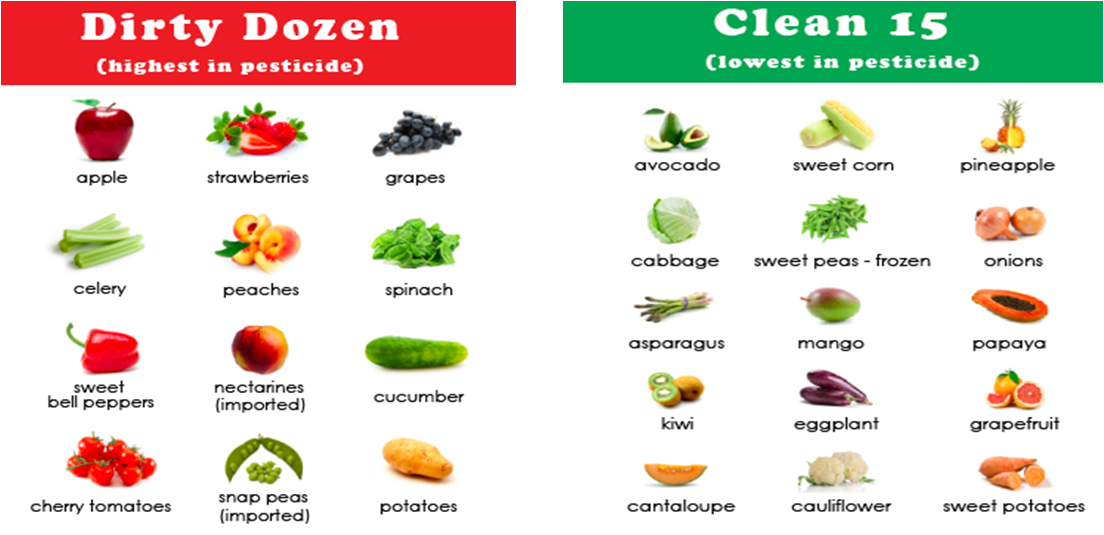by Kiera Boone
It’s no secret that people are starting to become more health conscious. With all the documentaries on fast food (i.e. SuperSize Me and Forks over Knives) and the BuzzFeed Facebook videos on fried delicacies and bacon covered treats, it’s hard to choose between what TASTES good and what IS good. So, to try to bridge the gap between taste and nutrition, it has become a trend for people to lean toward more organic products. These are products that are grown without the use of pesticides, synthetic fertilizers, sewage sludge, genetically modified organisms, or ionizing radiation. Choosing organic products also means animals that produce meat, poultry, eggs, and dairy products do not take antibiotics or growth hormones. Basically, going “organic” means that people must be more aware of the nutrition labels on products they buy when they go grocery shopping and try to get more fresh products. Although fertilizers, pesticides, and bioengineering can be productive for agricultural yields, the chemicals from those items may not be the best for our bodies in the long-run.
Why should I buy organic products?
Although we may want to eat healthier and choose organic items when grocery shopping sometimes it is not as easy as it seems. For example, organic foods are more expensive in general. Paying an extra dollar or two, may not seem like a big deal to some, but to others, that difference is often avoided. Another reason many people stray from organics is because they don’t know the benefits organic products can have. Why buy organic, when the same fresh product it cheaper and a lot bigger? Well, here are a few reasons why organic products can be worth the extra buck:
Benefit From More Nutrients! – It has been studied and proven that organically grown foods are substantially more nutritious. They contain more nutrients that we need such as vitamins, minerals, enzymes, and micronutrients. Furthermore, studies have also shown that five servings of organically grown vegetables like lettuce, spinach, and carrots have more Vitamin C than the same amount of conventionally grown veggies!
Avoid Harmful Chemicals! – Many conventional fruits and vegetables are grown with the use of lots of fertilizers and pesticides. More than 600 active chemicals are registered for agricultural use in America! The crazy thing about the many chemicals being sprayed on crops is that the Environmental Protection Agency (EPA) allows it. Many of the chemicals in the fertilizers and pesticides are approved by the EPA. Organic foods are free of those chemicals.
Avoid GMOs! – Genetically engineered foods and genetically modified organisms are saturating grocery stores all around us. GMOs, or “genetically modified organisms” are living organisms whose genetic material has been artificially manipulated in a laboratory through genetic engineering. The main problem with GMOs is that genetic engineering can sometimes add carcinogens in some foods. Carcinogens increase the risk for cancers. Buying organic products helps reduce the risk of GMOs.
A Guide to Shopping Organic
The Dirty Dozen
Whenever possible, buy these foods organic to avoid potential high levels of pesticide residue.
|
|
The Clean Fifteen
These are the foods that are okay to buy conventional when necessary because they have low levels of pesticide residue.
|
|
 Kiara Boone is an Atlanta, Georgia, native who is graduating from Baylor University with a Community Health degree. She is currently interning at the Waco McLennan County Public Health District. She enjoys cooking PINTEREST recipes, tough workouts, and writing poetry in her spare time. Contact Info: Kiara Boone, [email protected].
Kiara Boone is an Atlanta, Georgia, native who is graduating from Baylor University with a Community Health degree. She is currently interning at the Waco McLennan County Public Health District. She enjoys cooking PINTEREST recipes, tough workouts, and writing poetry in her spare time. Contact Info: Kiara Boone, [email protected].
The Act Locally Waco blog publishes posts with a connection to these aspirations for Waco. If you are interested in writing for the Act Locally Waco Blog, please email [email protected] for more information.
By George Eichenberg, bass player, Rising Sons
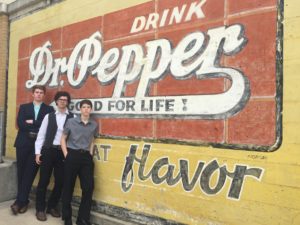 When my friends and I started a band three years ago, I never thought that one day I’d be packing my bags and my bass guitar and going on the road. But five days from now, Spencer Davis, Jackson Anderson and I — otherwise known as the Rising Sons trio — will be heading southeast to play gigs in Louisiana, Mississippi, Alabama and Florida in what we’ve dubbed our 2016 Gulf Coast Tour.
When my friends and I started a band three years ago, I never thought that one day I’d be packing my bags and my bass guitar and going on the road. But five days from now, Spencer Davis, Jackson Anderson and I — otherwise known as the Rising Sons trio — will be heading southeast to play gigs in Louisiana, Mississippi, Alabama and Florida in what we’ve dubbed our 2016 Gulf Coast Tour.
Going on tour sounds pretty cool, but we’re not exactly living the rock-n-roll lifestyle just yet. Our tour bus is a caravan of family cars. We’re not expecting crowds of screaming girls to rush the stage. And our venues don’t seat thousands of people. But that doesn’t make any of this less real or less important to us. We take seriously our job of performing the classic rock, jazz and country tunes that will entertain audiences near, and now, far.
What started out as just messing around on Friday nights has turned into a real paying job with pretty consistent income that has given me the ability to save money, upgrade my equipment and go out with my friends. That wouldn’t be possible without owners of restaurants like the Hippodrome, Manny’s and Jake’s Texas Tea House taking a chance on some teenage boys and their electric instruments — and hiring us again and again once they realize we’re serious about what we do.
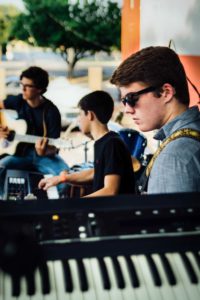 But more importantly, being part of the band — and spending many weekend nights playing music — has given me the opportunity to be part of something. You see, Spencer and Jackson have been playing music all their lives, but I didn’t pick up the bass until 7th grade music class. Outside of school, Jackson practiced with me and I started to understand how the bass adds another layer and gives every song a fuller sound — and how my contributions to the music make us better as a group.
But more importantly, being part of the band — and spending many weekend nights playing music — has given me the opportunity to be part of something. You see, Spencer and Jackson have been playing music all their lives, but I didn’t pick up the bass until 7th grade music class. Outside of school, Jackson practiced with me and I started to understand how the bass adds another layer and gives every song a fuller sound — and how my contributions to the music make us better as a group.
We’ve all worked hard to get here. And though we’ve had lots of help from our parents, we’ve put in a lot of our own sweat. From hours of perfecting every note of our favorite Eagles tune to hauling heavy gear to and from our gigs (now in our own cars — two of us are finally driving!), it’s not easy. We’ve felt everything from love and support to skepticism and doubt. But at the end of the day, when our Algebra teacher and his wife show up to hear us (OK, maybe it was also for the chicken fried steak) at a roadhouse 20 miles outside of town, we know we’re doing something right. When strangers start tapping their feet to the music and singing along, we might be onto something. We’re definitely having fun.
Now we’re taking it on the road. The t-shirts have been printed, the UHaul has been rented and our kick-off party plans have been made. The three of us are looking forward to playing for new audiences and picking up the musical influences of the southern coast. Are we under the illusion that this tour is going to make us famous or that we are going to be discovered? Nah. But as we head out this weekend, we’ll be keeping Waco in the rear view mirror and remembering it’s the good people of our hometown who helped us pave the way.
June 3 – Rising Sons 2016 Gulf Coast Tour Send-Off Party – Join Waco’s favorite teen trio and celebrate their June 4-12 2016 Gulf Coast Tour at this pre-tour performance and party. Cost: Free admission (not including food and drinks at Jake’s). Time: 6 PM – 9 PM. Location: Jake’s Texas Tea House, 613 Austin Ave. For more information please visit the website: www.ehandersonpr.com/rising-sons
 George Eichenberg is the bass player for the Rising Sons, a Texas teen trio that plays everything from the Eagles to John Mayer and lots in between. George is a junior at Vanguard College Preparatory School and when he’s not playing bass, you can probably find him on the court with the varsity basketball team at school. His parents are Alex and Gretchen Eichenberg; and he has a sister, Brigitte, 13, and a big chocolate Lab named Luke.
George Eichenberg is the bass player for the Rising Sons, a Texas teen trio that plays everything from the Eagles to John Mayer and lots in between. George is a junior at Vanguard College Preparatory School and when he’s not playing bass, you can probably find him on the court with the varsity basketball team at school. His parents are Alex and Gretchen Eichenberg; and he has a sister, Brigitte, 13, and a big chocolate Lab named Luke.
The Act Locally Waco blog publishes posts with a connection to these aspirations for Waco. If you are interested in writing for the Act Locally Waco Blog, please email [email protected] for more information.
According to the Project Link website, “Project Link is a new local program that started in Fall 2015 to help Waco-area high school students, currently at La Vega High School and University High School, and their families in charting a more assured and successful post-secondary journey through intense one-on-one college, career, and financial advising… At the high schools, the Project Link team works to create a college-going culture by developing an environment that recognizes the value of higher education, by building awareness of post-secondary resources, and by nurturing student’s individual college and career aspirations.” If you have questions about Project Link, feel free to contact Natalie James at [email protected] or at 254-299-8517. In today’s Act Locally Waco blog post, two Project Link participants share the positive impact this new program is having on their success as first generation college students.
by Carlos Gonzalez and Alexandria Aleman
 My name is Carlos Gonzalez, and I recently completed my second semester at TSTC. When I first got to TSTC, I was lost, but it’s kind of hard to remember now because I now know where everything is located, and one of the Success Coaches helped me with choosing my career path and major. The first semester went well, but my second semester started off a little different, because when I needed more help the Success Coach I was used to seeing no longer worked in that department. However, as luck would have it, I was contacted by Brandon Chappell, the Project Link Outreach Specialist at TSTC. I remember I was expecting someone much older when he contacted me, but luckily it’s easier for me to relate to him because he’s closer to my age. He was offering to help me with some of my college struggles basically anytime I needed him. We’ve talked about my grades, he’s helped me practice for a job interview, and when I noticed at the beginning of the semester I could not afford my textbooks, Brandon helped me to get 3 of my most expensive textbooks for free.
My name is Carlos Gonzalez, and I recently completed my second semester at TSTC. When I first got to TSTC, I was lost, but it’s kind of hard to remember now because I now know where everything is located, and one of the Success Coaches helped me with choosing my career path and major. The first semester went well, but my second semester started off a little different, because when I needed more help the Success Coach I was used to seeing no longer worked in that department. However, as luck would have it, I was contacted by Brandon Chappell, the Project Link Outreach Specialist at TSTC. I remember I was expecting someone much older when he contacted me, but luckily it’s easier for me to relate to him because he’s closer to my age. He was offering to help me with some of my college struggles basically anytime I needed him. We’ve talked about my grades, he’s helped me practice for a job interview, and when I noticed at the beginning of the semester I could not afford my textbooks, Brandon helped me to get 3 of my most expensive textbooks for free.
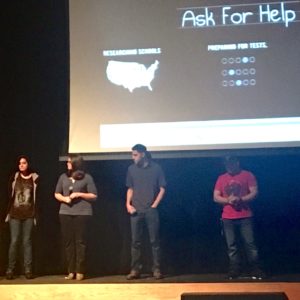 I am a first generation college student, so I was excited to be in college, but I had a lot of questions. Brandon has been there to address a lot of my concerns and given me the opportunity to volunteer on a student panel to speak about my experiences as a first generation college student with some of the Project Link students still in high school. I think Project Link is very helpful. Brandon has been able to help me get a better understanding of the things that happen on campus. To me, Project Link just wants to help the students do their best and succeed in college.
I am a first generation college student, so I was excited to be in college, but I had a lot of questions. Brandon has been there to address a lot of my concerns and given me the opportunity to volunteer on a student panel to speak about my experiences as a first generation college student with some of the Project Link students still in high school. I think Project Link is very helpful. Brandon has been able to help me get a better understanding of the things that happen on campus. To me, Project Link just wants to help the students do their best and succeed in college.
I definitely think Project Link will be beneficial for me in the future to explore different career opportunities as well. I know I can always use Project Link if I have questions about financial aid or any other aspect of college. I appreciate the help I have been getting from Brandon Chappell. He is a very good person to talk to. Even though he can be annoying when he bugs me about my grades, he seems like a fun person to hang out with too.
 My name is Alexandria Aleman. I am a graduate of La Vega High School and have recently completed my second semester at McLennan Community College. Project Link at MCC has been a safety net for me. I try to stay involved with the workshops and events so that it gives me more experience in how college life works. I feel like having this extra help has given me the confidence to keep on track with my career, because it provides me with crucial information about what is happening on campus and how it can benefit us.
My name is Alexandria Aleman. I am a graduate of La Vega High School and have recently completed my second semester at McLennan Community College. Project Link at MCC has been a safety net for me. I try to stay involved with the workshops and events so that it gives me more experience in how college life works. I feel like having this extra help has given me the confidence to keep on track with my career, because it provides me with crucial information about what is happening on campus and how it can benefit us.
As a first-time-in-college and first generation student at McLennan Community College, I have learned a lot about how the real world works, but Project Link has expanded my knowledge further by introducing me to an environment where I do not feel alone or unwelcome. The program has helped me make meaningful connections with other people who are going through the same thing. I’ve been fortunate enough to meet some wonderful peers that are willing to help each other with anything.
I have also experienced a few events where it has helped me build on my public speaking 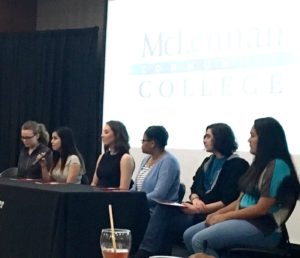 skills. For example, I was part of a student panel that answered questions and shared experiences with other students who will soon be entering the same environment. It helped me practice my public speaking, and I was able to meet some amazing people.
skills. For example, I was part of a student panel that answered questions and shared experiences with other students who will soon be entering the same environment. It helped me practice my public speaking, and I was able to meet some amazing people.
In college, there will be times when you will need help or advice, and Project Link has the right person to help. I have always felt that I can go to her to know what I need to do to get my work done. Whatever I may need she makes sure I get it.
Project Link has provided a lot of workshops that prepare you for anything that comes your way. The workshops range from balancing your finances to taking good notes and have all been very helpful to me. Being in college and having a lot of freedom after high school is amazing but it can be easy to procrastinate and get off track. In the beginning, I felt like I was off track a bit, but with Project Link, I was able to get the help I needed to get back on track.
What has been most helpful is the open, caring and kind Project Link Coordinator, Mrs. James, who makes talking to someone easy. She is there for all her students, and she makes you feel at home. It is like making another friend because talking to her doesn’t feel like speaking to another person in charge. There is truly a family in the making and I hope that one day my sisters can take part of this wonderful program.
Project Link is not just another college readiness program; it is a family — a family that is always there for you with help and things that will benefit you in the long run. I don’t regret being part of this program; I make good use of what is given to me, and that is the knowledge and experience of the real world.
 Carlos Gonzalez is a second-semester student at TSTC. He is a graduate of La Vega High School and is double-majoring in Instrumentation and Electrical Power and Control. After college, he plans on having a good job and being able to help his family financially and possibly exploring other careers.
Carlos Gonzalez is a second-semester student at TSTC. He is a graduate of La Vega High School and is double-majoring in Instrumentation and Electrical Power and Control. After college, he plans on having a good job and being able to help his family financially and possibly exploring other careers.
 Alexandria Aleman is a recent graduate of La Vega High school, and a current college student at McLennan Community College. Alexandria is pursuing her Associates in general academics until she can transfer to Tarleton State University in the Spring of 2016. At Tarleton she plans to earn her Bachelors in Psychology, and then her Masters and PHD at Baylor University. She is attending college to give her parents, sisters and herself a better life.
Alexandria Aleman is a recent graduate of La Vega High school, and a current college student at McLennan Community College. Alexandria is pursuing her Associates in general academics until she can transfer to Tarleton State University in the Spring of 2016. At Tarleton she plans to earn her Bachelors in Psychology, and then her Masters and PHD at Baylor University. She is attending college to give her parents, sisters and herself a better life.
The Act Locally Waco blog publishes posts with a connection to these aspirations for Waco. If you are interested in writing for the Act Locally Waco Blog, please email [email protected] for more information.
By Diego Loredo
I’ve finally finished my first two years of college. For most college students, the first two years are a transition period where you’re still getting used to the college life. Afterwards, it’s when you really have to get serious about college and thinking about what will happen after graduation.
My first two years at UNT have been pretty crazy. I’ve lived in a dorm for my freshmen year but moved into an apartment this school year. I’ve met so many great people and made my own little group of friends who I hang with all the time. I took part in intramural sports such as soccer and football and I got to see what kind of city Denton really is. But after these two years, what next? For me, what’s next is a long and bumpy road to graduation.
First of all, I need to get serious with my classes. My GPA has dropped and I’m going to have to bring it back up. I’m also going to have to think about getting experience in the career that I want to pursue as well as networking with people to get connections so that I can have someone to look to when I’m looking for a job. I also plan on studying abroad next summer so I will need to save up money for that. There’s so much that will be going on these next two years and I would be lying if I said I wasn’t intimidated by it all.
Regarding getting experience, I have already worked with a nonprofit called Minnie’s Food Pantry in Plano where I worked as a communications expert. I have made a communications plan, a fact sheet, an infographic, a feature story, and a media list for them to use. This was all done in two classes, which was great because it provided me with all of this experience. Plus, my professor had us all make an online portfolio, complete our resume, and create business cards to ensure that we are prepared. I’m really grateful to my professor for that and I know that they will come in handy down the road. I plan on doing community or media relations as a career (preferably in sports PR) and working with Minnie’s has provided me with valuable insight that I know will be useful.
Although working with Minnie’s was fun, I’m the most excited about getting the chance to study abroad. UNT offers opportunities to students to study abroad and take classes while also learning about the different cultures there. For me, I think my options are Japan and England. England is my first choice because I’ve always wanted to travel there but also because I’m a huge soccer fan (I’m a Manchester United fan) and traveling to see the different soccer stadiums there would be great. I decided to get a job this summer to start saving up for studying abroad next year.
So as you can see, I have a lot in store for me for my final two years at UNT. I may even graduate a semester early because of the college credits I got during my senior year in high school. But I’m pretty sure I’ll be taking my time and will probably end up graduating in the Spring of 2018 because I don’t want to rush myself.
As for advice for other college students, new or current, it’s to enjoy your first two years of college. Use that time to get out and experience that “college life.” Join organizations, meet new people, play intramural sports, or just go around and see what your city is like. Because after those two years, that’s when you really have to take not only college seriously but what your future career will be like. I’m not saying that the last two years of college will be boring, but it’s best to use it to focus more on college and your future career.
I’ve learned so much these past two years and I like to think I’ve matured a bit. I know what to do and what not to do and I know about the stresses of juggling college, social life, and personal life together. I also know what I need to do to succeed in my career field, which is crazy because I never thought I would get to this point a few years back. I know it’s going to be tough but I also know that I have the support of my friends and family to help me get through it all.
 Diego Loredo is a sophomore at the University of North Texas. He is majoring in public relations. He graduated from University High School in 2014. Although he is still not quite sure what exactly he wants to do, he thinks he wants to work somewhere in sports PR (preferably soccer or college football). His hobbies include playing soccer and golf. He is 19 years old.
Diego Loredo is a sophomore at the University of North Texas. He is majoring in public relations. He graduated from University High School in 2014. Although he is still not quite sure what exactly he wants to do, he thinks he wants to work somewhere in sports PR (preferably soccer or college football). His hobbies include playing soccer and golf. He is 19 years old.
The Act Locally Waco blog publishes posts with a connection to these Aspirations for Waco. If you are interested in writing for the Act Locally Waco Blog, please email [email protected] for more information.
By Lucas Land
One summer, when I was in college, I worked at a Lutheran camp in the Rocky Mountains. The camp had a high population of what has come to be called “crunchy” types. Many of my peers at this camp were vegetarians. Now, I grew up in Texas and can’t remember a meal from my childhood that didn’t have meat in it. I wasn’t sure about giving up meat, but I was inspired by their passion for social justice and their faith.
So, mostly as an experiment, that Christmas I decided to give up meat and try a vegetarian diet. I was really nervous that it might make me sick. I had never NOT eaten meat. But I didn’t get sick. I didn’t wither away or become too weak to stand. Then I read Fast Food Nation by Eric Schlosser on a plane to Japan to visit my girlfriend, now wife. I thought to myself, “I keep finding more reasons to be vegetarian. I think I’ll stick with it.” I was vegetarian for nine years after that.
Lest you think my newfound diet bestowed some sort of righteousness on me, let me say that I was (and am) pretty lazy when it comes to food. I might have thought a lot about food, but when it came to the act of satisfying my hunger at any given moment a frozen pizza worked as well as anything (and was vegetarian too).
My little experiment with vegetarianism led me to ask more questions about what I was eating, where it came from, and what that meant for myself, other people and the planet. It’s a rabbit trail I’m still traveling down. The trail has connected up with a lot of other trails along the way, as I realized that the way our food is produced is connected to so many issues.
If you care about women’s issues, you should care about agriculture. The majority of the world’s farmers are women. If you care about immigration, then you should think about the conditions of those who are growing and harvesting your food. If you care about poverty, you have to think about what kind of food is available to people in food deserts like East Waco, and how that affects rates of obesity and diabetes.
Thinking about the food we eat is an entry point to thinking about a lot of different issues. This is what led me to leave a comfortable life with a house payment and steady income and move with my wife and two young kids to World Hunger Relief, Inc. (WHRI) for their internship program. I know the next step in my own journey is controversial among some vegetarians, vegans and environmentalists, but after moving to WHRI I felt like I could start eating meat again. I knew the animals that fed me and the conditions they were raised in. I was willing to butcher them which was (and still is) an emotional, difficult, and meaningful experience.
Reducing or eliminating your consumption of meat is still one of the best things you can do to reduce your carbon footprint and to combat climate change. A recent article from Salon spells out the link between meat consumption and climate change. The difference for me now when I eat local meat, or chickens that I’ve raised, is that I’m more mindful and connected to the source and consequences of what I’m eating. I could dedicate a whole other article just to this topic (and maybe I will).
What I realized through my own journey is that raising our consciousness and awareness of these issues is the most important and perhaps hardest part of working towards sustainability. Our year at the farm was one of exploring, learning, and deepening our commitment to a more sustainable world related to food, agriculture and every area of our lives. Ultimately, sustainability is about finding ways for humans to thrive alongside the rest of the ecosystems and environments that make up our habitat. This requires us to be more aware of the way the food we eat, and other aspects of our lives that we take for granted, affect the climate and environment, from our local watershed to the interconnected global system that sustains life on this planet we call home.
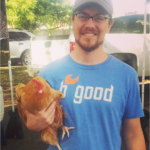 Lucas Land is an eco-theologian, urban farmer, activist, aspiring master naturalist, facilitator, musician, and writer. He is avoiding growing up by constantly learning and trying new things. He also works in Grants Management for Waco ISD. He lives with his wife, three children, flock of chickens, dog, and cat in the Sanger Heights Neighborhood in North Waco.
Lucas Land is an eco-theologian, urban farmer, activist, aspiring master naturalist, facilitator, musician, and writer. He is avoiding growing up by constantly learning and trying new things. He also works in Grants Management for Waco ISD. He lives with his wife, three children, flock of chickens, dog, and cat in the Sanger Heights Neighborhood in North Waco.
The Act Locally Waco blog publishes posts with a connection to these aspirations for Waco. If you are interested in writing for the Act Locally Waco Blog, please email [email protected] for more information.
By Jerrod Clark
Well Waco, it’s Back to the future we go! No, I’m not referencing the blockbuster film, I am calling all Wacoans to dream about our future city and how we want her to look. Are we satisfied with a city that is economically sound, yet segregated? Or do we want her to be whole and welcoming, a city where trust exists and where healthy community can flourish? And if that is what we want, how do we get there?
A first step is to resurrect the notion of working for “the common good.” I must recognize that I did not just arrive at prosperity solely by my own hard work. I stand on the shoulders of those that have gone before me. My family, support system, tax payers—I have benefitted from the collective whole who sacrificed for the common good. I am a grateful recipient of all of that.
Those that invested in me did so without expectation of benefit, however, they do benefit. The return on their investment in the development of others is not zero — everyone’s future depends on the youth who come behind them.
If I were born in a family where education was not valued, I too might be uneducated or under-educated and possibly be ill-equipped or un-empowered to reach my fullest potential. However, if my community would pick up the slack and help bridge the gaps by helping to equip me with the skills needed to flourish, then I might be able to make up for that disadvantage. Then I would be able to make my own contribution to the “common good.”
Because of that notion, I cannot be idle. I cannot be partial. I have to work on being inclusive so that others can also share in the benefits of the common good of the community.
As I think about these things, I am reminded of words attributed to Dietrich Bonhoeffer. He said, “Silence in the face of evil is itself evil: God will not hold us guiltless. Not to speak is to speak. Not to act is to act.” The poor are a reflection on our inaction and a commentary on our priorities as a community. We should strive to lift and elevate those who have been left behind and pushed to the margins.
Change does not have to be “throwing out the baby with the bath water” so to speak. This can be incremental — as small as one degree. This is the One-Degree Principal.[1] Have you heard of it? It’s a simple concept and easy to remember. It has a lot to do with taking small, incremental steps in the direction of our goals. When added together, the small steps produce big results over time. A minute one-degree of change has huge outcomes over time and/or distance. It just depends if that one-degree of change is positive or negative.
 To illustrate: Imagine a Wacoan and an Austinite go on a business trip to Montreal, Canada. They each fly out of their respective cities and plan to return the same way. On the return flight, however, the two pilots each get off bearing just one degree in the wrong direction. As a result, the Austinite ends up in Waco and the Wacoan ends up in Austin.
To illustrate: Imagine a Wacoan and an Austinite go on a business trip to Montreal, Canada. They each fly out of their respective cities and plan to return the same way. On the return flight, however, the two pilots each get off bearing just one degree in the wrong direction. As a result, the Austinite ends up in Waco and the Wacoan ends up in Austin.
In much the same way, each of us are traveling along our path, and based on our habits and actions one can project where he or she will be in ten years. However, if you decide to make just one small change in your actions – even a 1 degree change – that one change will alter your path, and ultimately alter your outcome. This is true when it comes to saving money, building relationships, getting fit, deciding the fate of a city … in fact every area of our lives. Let it begin with me.
I am a realist-idealist! I recognize that this sounds like an oxymoron. What I mean is, I would prefer that we strive to arrive at a place that is ideal! But, I know that is not realistic. However, if we can shoot for somewhere between “less than ideal” and “more than mediocrity,” then I do believe that is a realistic expectation.
We can’t just stay where we are though, something has to give. These are tumultuous and perilous times. Let us not allow politics to divide us over doing the right thing for the common good. Let’s let the common good and morality unite us to do the right thing. We have come a long way. Thanks be to God that most of us do not know the horrors of The Great Depression of 1929-1939. However, we still have homeless individuals dying on our streets. Affordable housing stock is still lacking. Jobs in the private sector are still not 100 percent on board with a Fair Chance Hiring Policy that would give opportunity to more formerly incarcerated individuals to become contributors to the common good.
How do we get where we want to go? What do we want our future to look like? We are co-authors of our destiny. We make our plans, but God directs our steps, right? What degree of change can we make? Let’s work together today to be a fair city, one where all can be prosperous and everyone wins. It takes a village to raise a child, so they say. I guess that makes us village people! We can be one community with many tribes working together for a common goal – understanding that if the whole community prospers, then we too shall prosper.
“Also, seek the peace and prosperity of the city to which I have carried you into exile. Pray to the Lord for it, because if it prospers, you too will prosper.” — Jeremiah 29:7
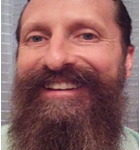 Jerrod Clark is a Texas transplant. He came to Waco in 1996 to attend school and never left. He is a graduate of Baylor University’s Diana R. Garland School of Social Work and is the Social Worker at the Meyer Center for Urban Ministries. He has been working with the homeless since 1998. He and his wife, Carolina of seven years have two daughters, Nichole and Hannah Jean. They are active participants at Church Under the Bridge.
Jerrod Clark is a Texas transplant. He came to Waco in 1996 to attend school and never left. He is a graduate of Baylor University’s Diana R. Garland School of Social Work and is the Social Worker at the Meyer Center for Urban Ministries. He has been working with the homeless since 1998. He and his wife, Carolina of seven years have two daughters, Nichole and Hannah Jean. They are active participants at Church Under the Bridge.
The Act Locally Waco blog publishes posts with a connection to these aspirations for Waco. If you are interested in writing for the Act Locally Waco Blog, please email [email protected] for more information.
[1] Adapted from: http://www.almondtreeministries.com.au/the-one-degree-principle/
By Amber Harris
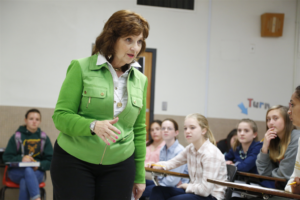 On April 7, 2016, the Poet Laureate of Texas, Dr. Carmen Tafolla, challenged students at Tennyson Middle School to share their experiences and stories. The assembly introduced students to Planting Poet Trees, a project Dr. Tafolla created that provides students the opportunity to have their works published in an anthology, as well as receive literary critique and support from Dr. Tafolla. Tennyson was honored to host this seminar, having been only one of 20 campuses in the entire state selected to participate in the Planting Poet Trees project.
On April 7, 2016, the Poet Laureate of Texas, Dr. Carmen Tafolla, challenged students at Tennyson Middle School to share their experiences and stories. The assembly introduced students to Planting Poet Trees, a project Dr. Tafolla created that provides students the opportunity to have their works published in an anthology, as well as receive literary critique and support from Dr. Tafolla. Tennyson was honored to host this seminar, having been only one of 20 campuses in the entire state selected to participate in the Planting Poet Trees project.
During the assembly, Dr. Tafolla painted a visual picture of her experience visiting a tortilleria to demonstrate how important your surroundings are in inspiring your writing. Students laughed as she blended together English, Spanish, sensory language, and body language to bring this poem to life. Dr. Tafolla explained before sharing this poem that you don’t have to live in a big city to have something meaningful and important to write about. She connected her personal experiences growing up in a San Antonio barrio and how she learned through writing that her neighborhood had many interesting and important stories to share with the world. “You have something unique to contribute,” Dr. Tafolla emphasized throughout the assembly. “Let those words out…Be friends with your words…Catch the words in the air and put them on paper.”
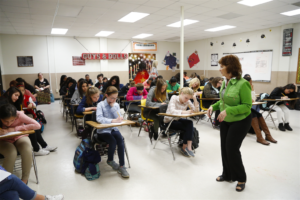 After the assembly, Dr. Tafolla was able to work with a small group of students representing each grade level in a writing seminar. Students engaged in creative writing exercises to begin their own poems for submission in the anthology. I asked some of my students who attended the seminar for their thoughts and they all agreed that the experience was valuable. One student commented that the feedback she received was useful and led to more ideas for her poem. Another student shared that poetry is his favorite writing style and how much he appreciated the opportunity to engage with this seminar and assembly.
After the assembly, Dr. Tafolla was able to work with a small group of students representing each grade level in a writing seminar. Students engaged in creative writing exercises to begin their own poems for submission in the anthology. I asked some of my students who attended the seminar for their thoughts and they all agreed that the experience was valuable. One student commented that the feedback she received was useful and led to more ideas for her poem. Another student shared that poetry is his favorite writing style and how much he appreciated the opportunity to engage with this seminar and assembly.
This opportunity was thanks to two of Tennyson’s staff members: English Teacher Kaleigh Gibbons and School Librarian Mary McCaghren. Through a network of connections, they completed the grant that led to Tennyson being selected. Mary McCaghren was excited at the opportunity to expose students to spoken word poetry. For her, this was a way to help students heal from experiences they have faced, to have an outlet to be heard. The grant also paved the way for a poetry collection to be added to Tennyson’s library, increasing the amount of poetry selections students can choose from.
The assembly and seminar reminded students that they “have the finest computers in the world, your mind.” The impact has been great among students since the assembly. Many students have checked out the new poetry books added to our library, including The Crossover by Kwame Alexander, a book of poems focusing on basketball that Dr. Tafolla read excerpts from during the assembly. Our students love to be creative and have stories to share. When we give them platforms to express themselves, the impact can be life changing.
Amber Harris is currently an English Teacher for Waco ISD. She is passionate about education reform and mental health reform. She is also very passionate about why In-N-Out burger is the best fast food burger. Originally from Los Angeles, she spends her weekends exploring new parts of Central Texas with her fiancé (and sometimes with their dog, too!). She is looking forward to becoming even more involved in her church and the Waco community after their wedding this summer.
The Act Locally Waco blog publishes posts with a connection to these aspirations for Waco. If you are interested in writing for the Act Locally Waco Blog, please email [email protected] for more information.
by Craig Nash
Because the Texas Hunger Initiative cooperates in some way with just about every group, individual and agency devoted to ending food insecurity in Waco, people often identify us as one of those entities. In the short amount of time I have been with THI, I’ve been asked when the next Farm Day will be, how an elderly parent can sign up for Meals & Wheels service, how our food pantry determines who gets food, and what the estimated opening date will be of our new non-profit grocery store. It’s an honor to be associated with such great organizations as Mission Waco, M&W and World Hunger Relief! But what is more in line with our day-to-day work is when we are called the “Summer Meals People.”
Although the Summer Food Service Program, administered by the USDA, has been around since 1968, it has in recent years received more exposure in Texas because of the promotional work of the Child Hunger Outreach Team in our regional offices around the state. I first heard about it several years ago as a minister in town, and now am working to inform everyone in our community about this important tool to help address nutrition gaps among our area children.
When summer hits it brings with it a host of challenges for families. Schedules have to be coordinated differently. Childcare has to be arranged. Camps, sports, and other activities begin to take up time. These new realities can bring with them added financial burdens that don’t always exist when school is in session. The Summer Food Service Program is intended to help families overcome the financial challenge associated with nutrition, especially in communities where the majority of children qualify for free and reduced meals.
To do this, the USDA contracts with sponsors who operate summer feeding sites around the country. The largest and most prominent of these sponsors are local school districts. Both Waco and La Vega ISDs work tirelessly during the summer on campus and with mobile meal routes that serve libraries, parks and community centers. In addition to school districts, faith based non-profit groups like Road to Damascus and City Square operate summer feeding sites in apartment complexes and churches. In the Waco and La Vega School Districts, (including those sites operated by non-profits) lunch is served free to any child aged 18 and under; no identification is required to participate.
As we approach the summer, the Heart of Texas Sponsor Council, which includes the aforementioned school districts and non-profits, has set a goal this summer to increase awareness of the summer meals program in and around Waco. There are ways you can help us make that happen.
First, be aware of the nearest summer lunch sites in your area, and spread the word to your neighbors. In the next few weeks you will begin to see posters, signs and door hangers pop up all over the city with this information, but word of mouth is still the most powerful method of communication. You can locate your nearest site here– http://www.fns.usda.gov/summerfoodrocks. (This website will be continually updated as sites are added before the summer begins.) You can also find sites by dialing 211. Most all sites in Waco will begin summer food service on Monday, June 6.
Second, the H.O.T. Sponsor Council is hosting community wide kick off events at four sites around the city on Tuesday, June 14th. We need help from individuals, church groups and other organizations to help pull these events off. The events themselves will be no longer than 2 hours, with some promotion during the week leading up to it. If you or your organization can help in any way, please email C[email protected].
Lastly, a more long-term way you can help alleviate summer food insecurity is speaking with your churches, community organizations and groups to consider being a future site where one of our sponsors can serve summer meals. If this is something your group is interested in for future summers, I can organize a visit to a current site this summer for you to see how the program is operated.
By working together we can be known as the town where no kid goes hungry during the summer!
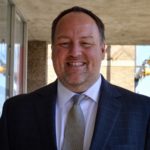 Craig Nash has lived in Waco since 2000. Since then he has worked at Baylor, been a seminary student, managed a hotel restaurant, been the “Barnes and Noble guy,” pastored a church and once again works for Baylor through the Texas Hunger Initiative. He lives with his dog Jane, religiously re-watches the same 4 series on Netflix over and over again, and considers himself an amateur country music historian.
Craig Nash has lived in Waco since 2000. Since then he has worked at Baylor, been a seminary student, managed a hotel restaurant, been the “Barnes and Noble guy,” pastored a church and once again works for Baylor through the Texas Hunger Initiative. He lives with his dog Jane, religiously re-watches the same 4 series on Netflix over and over again, and considers himself an amateur country music historian.
The Act Locally Waco blog publishes posts with a connection to these aspirations for Waco. If you are interested in writing for the Act Locally Waco Blog, please email [email protected] for more information.
By Diamante Maya
“We are a box of crayons, each one of us unique. But when we get together the picture is complete.”
 The other day I was getting my nails done at a shop in Waco. The shop is run by an opposite-sex, middle-aged, Asian couple. There was a Black mother with her three daughters getting their eye brows waxed. Then an older, White woman walked in. I was at the counter paying as she pulled up a picture on her phone. It was a picture of nails decorated with the confederate flag. She was asking if they could decorate her nails the same way. As I was walking out of the store, I saw a Black, female, same-gender couple holding hands as they entered. In a short window of time I got a snap shot of Waco that has not been my typical experience.
The other day I was getting my nails done at a shop in Waco. The shop is run by an opposite-sex, middle-aged, Asian couple. There was a Black mother with her three daughters getting their eye brows waxed. Then an older, White woman walked in. I was at the counter paying as she pulled up a picture on her phone. It was a picture of nails decorated with the confederate flag. She was asking if they could decorate her nails the same way. As I was walking out of the store, I saw a Black, female, same-gender couple holding hands as they entered. In a short window of time I got a snap shot of Waco that has not been my typical experience.
In my very being I embody diversity. Of my four grandparents, three were born in countries outside of the United States. One grandpa was born in Turkey, one grandma in England, and my other grandma in Cuba. My mother was born in England and my father in Cuba. My dad grew up going to the synagogue with his dad and Catholic Church with his mom. I grew up in the 80’s and 90’s at the height of racial integration of the public schools. In recent years, schools appear to be reverting back to pre-80’s segregation, but the school I grew up in was very diverse. In my high school classes in Northwest Houston, I had friends from many different racial and cultural backgrounds. I had Black, Nigerian, Indian, Asian, Mexican, Salvadorian, White, and mixed race classmates. There were students that were Muslim and wore hijab’s over their heads. There were Catholic students, Evangelical Christian students, and students with no religious affiliation. There were recent immigrants and students from families of many generations in the United States.
Diversity, simply put, is all that makes us different. Just like in creation we find a vast array of differences among flowers and trees, we as humans can be so immeasurably different from one another. Our differences can be as mundane as curly hair vs. straight hair, or as controversial as gay or straight, democrat or republican. Walter Lippmann said “Where we all think alike, no one thinks very much.” Engaging with those that are different than us, when done in a respectful and humble manner, can provide a healthy challenge to our thinking and acting.
Our differences also have the potential to divide and harm us. As humans, our craving to be right can cause us to fail at compassion. We can fail at experiencing the splendor of our differences because, at times, we cannot agree to disagree. In our failings, we can intentionally or unintentionally harm others. We can let fear and judgment drive us and miss opportunities to radically love and experience the infinite display of beauty amongst us. We can get stuck in the purely green grasslands in parts of central Texas and miss out on the fields and fields of brilliant blue bonnets in Ennis, Texas. Remarkably, we have the power to make choices. We have the power to choose to profoundly engage with those different from us. We have the potential to expand all that we can experience in this life and get closer to reaching our full potential as humanity.
I recently got to participate in yet another picture in Waco of unity across differences as I attended the 100-year anniversary memorial service for Jesse Washington, a Black teenager who was brutally tortured and lynched in Waco in 1916. The room was full with an estimated 250 people from different races, religions, sexual orientations, gender identities, ages, national origins, and genders to name a few. In the midst of our differences, in that moment, in that space, we were unified in the remembering of a horror from the past and looking towards hope for the future.
As Waco continues to develop its identity and culture as a city, I hope we can become more and more a city that welcomes and embraces diversity. Not diversity that inflicts harm on others, but diversity that causes us to be challenged in our assumptions and see the exquisiteness in every human being. As I always tell the students I work with, if we were all the same, this world would be so boring. It can be easy to use what is familiar to us as a measuring stick for right and wrong, moral and immoral. But if we can take the time to really get to know people that are different from us, we can begin to see and revel in the immense beauty in our diversity. Our eyes can be further opened to the reality that although we may be different, we have the common human experiences of love, joy, pain, suffering, anger, and compassion. May we be a city that takes up the challenge of engaging in and celebrating diversity while preserving human dignity and worth! And as Shane DeRolf talks about in his poem, may our differences add magnificent color to all that we call Waco!
The Crayon Box That Talked
by Shane DeRolf
While walking in a toy store the day before today
I overheard a crayon box with many things to say.
“I don’t like Red!” said Yellow, and Green said, “Nor do I!
And no one here likes Orange, but no one knows just why.”
“We are a bunch of crayons that doesn’t get along,”
said Blue to all the others, “Something here is wrong!”
Well, I bought that box of crayons and took it home with me,
and laid out all the colors so the crayons could all see.
They watched me as I colored with Red and Blue and Green,
And Black and White and Orange and every color in between.
They watched as Green became the grass and Blue became the sky.
The Yellow sun was shining bright on White clouds drifting by.
Colors were changing as they touched, becoming something new.
They watched me as I colored, they watched ’til I was through.
And when I’d finally finished, I began to walk away.
And as I did, the crayon box had something more to say.
“I do like Red!” said Yellow, and Green said, “So do I!
And, Blue, you were terrific so high up in the sky!”
“We are a box of crayons, each one of us unique.
But when we get together the picture is complete.”
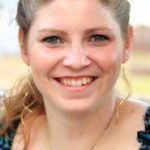 Diamante Maya is a part of an intentional Christian community in the beautifully diverse Brook Oaks neighborhood in North Waco. She gets the privilege of exercising her passion for cultural sensitivity and valuing the dignity and worth of every human being through her career as a Social Worker and through simply trying to be a good neighbor.
Diamante Maya is a part of an intentional Christian community in the beautifully diverse Brook Oaks neighborhood in North Waco. She gets the privilege of exercising her passion for cultural sensitivity and valuing the dignity and worth of every human being through her career as a Social Worker and through simply trying to be a good neighbor.
The Act Locally Waco blog publishes posts with a connection to these aspirations for Waco. If you are interested in writing for the Act Locally Waco Blog, please email [email protected] for more information.
by Jorge Burmicky
Last week, I wrote about social identities and how they interact with each other in the context of Waco. I talked about owning these identities and allowing them to inform our engagement with our surroundings. Today, I will spend more time exploring my perceptions of living in a city that attracts people from diverse backgrounds and various walks of life while acknowledging my own personal biases and limited experiences.
First off, as I previously mentioned in Part I, I moved to Waco because of a job at Baylor. What I did not know is that Waco/Central Texas would offer me an education of a lifetime. I certainly wasn’t aware of the true extent of the so called “Southern Hospitality” and the genuine desire many people have to be helpful and charitable towards residents of their own community. At the same time, I have also learned (generally speaking) a lot about the intersections of religion, race, and politics in the South (or more specifically, Texas). For some, this is perceived as a touchy subject not welcomed for conversation. For others, this subject affects their daily lives (positively and negatively) and they don’t necessarily get to “choose” whether to engage with it or not. It is simply a part of their day-to-day.
Personally, I experience certain privileges and disadvantages because of my various, interwoven social identities. More specifically, because I am a male, I hardly ever worry about my personal safety or fear of being harassed at night, which is quite different for my female counterparts. Additionally, because of my religious affiliation (Christian), I had a very easy time looking for a church when I moved to Waco; there are literally dozens of options to meet my needs as a member of the majority religion group. As a Baylor staff member, I also have access to Baylor athletic events for free (except for football) and the many perks that come with working for one of the largest employers in the city. These are just a few examples of how my social identities affect my daily life.
Conversely, I also experience certain disadvantages. As a non US citizen, I often hear people’s disdain towards immigrant communities (particularly, the Latino community) and hundreds of myths about life as an immigrant in this country. As an educator, I often hear students (and adults) argue strongly about their political views on immigration not knowing a single fact about the complexity of the system. For example, people assume that I can easily obtain US citizenship simply because I have a job and have lived here for many years, but in reality, whether I choose to pursue it or not, I am still years away from even being eligible for citizenship, which shocks people. As a result, I have made it a priority to share the real complexities of our immigration system, especially living in a city with a fairly diverse population and a visible Latino presence.
However, how does this apply to living in Waco? First off, I would say it is incredibly important to be aware of your very own identities (i.e. religion, race/ethnicity, gender, etc.) that inform your perceptions of the community around you, particularly a diverse and complex one like Waco. Lastly, I have truly enjoyed not only learning about myself in the context of Waco/Baylor but about other people’s stories and what makes them a citizen of this community. Yes, it is complex, but it is also rich and life-giving, which makes our journey in Waco all the worthwhile!
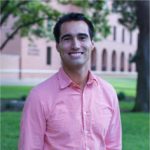 Jorge Burmicky currently works at Baylor University in the department of Campus Living & Learning. He’s passionate about college student development and contemporary issues in higher education, particularly access and retention of underrepresented students. He is married to Monica who works at McLennan Community College as the director of TRIO Student Support Services. They are expecting their first born (baby girl!) in June and couldn’t be more excited about it!
Jorge Burmicky currently works at Baylor University in the department of Campus Living & Learning. He’s passionate about college student development and contemporary issues in higher education, particularly access and retention of underrepresented students. He is married to Monica who works at McLennan Community College as the director of TRIO Student Support Services. They are expecting their first born (baby girl!) in June and couldn’t be more excited about it!
The Act Locally Waco blog publishes posts with a connection to these aspirations for Waco. If you are interested in writing for the Act Locally Waco Blog, please email [email protected] for more information.

